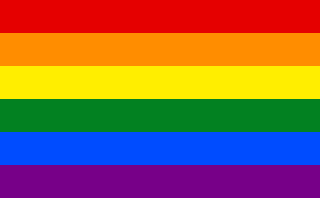LGBTQ people
Lesbian, gay, bisexual, transgender, and queer people From Wikipedia, the free encyclopedia
LGBTQ people are individuals who are lesbian, gay, bisexual, transgender, queer, or questioning (abbreviated "LGBTQ"). The group is generally conceived as broadly encompassing all indviduals who are part of a sexual or gender minority, including all sexualities, romantic orientations, sex characteristics, and gender identities that are not heterosexual, heteroromantic, cisgender, or endosex.
Scope and terminology
A broad array of sexual and gender minority identities are usually included in who is considered LGBTQ. The term gender, sexual, and romantic minorities is sometimes used as an alternative umbrella term for this group.[1][2]
Groups that make up the larger group of LGBTQ people include:
- People with a sexual orientation that is non-heterosexual, including lesbians, gay men, bisexual people, and asexual people
- People who are transgender or non-binary
- People who are aromantic
- People who are intersex
- Queer people, which is sometimes used as an alternative descriptor for LGBTQ people generally, and sometimes as a specific identity
Community

LGBTQ people may participate in the LGBTQ community, which may be defined by shared LGBTQ culture, by shared geography (such as gay villages), or by participation in LGBTQ-focused organizations. The LGBTQ community includes elements such as LGBTQ social movements (including LGBTQ rights organizations), LGBTQ student groups in schools and universities, and LGBTQ-affirming religious groups. LGBTQ activists and sociologists see LGBTQ community-building as a counterweight to heterosexism, homophobia, biphobia, transphobia, sexualism, and conformist pressures that exist in the larger society. Not all LGBTQ people consider themselves part of the LGBTQ community.
Culture

LGBTQ culture varies widely by geography and the identity of the participants. Elements common to cultures of gay, lesbian, bisexual, transgender, and intersex people include:
- Pride movements, including pride parades
- Events such as the Gay Games and Southern Decadence
- LGBTQ media and works by LGBTQ artists, including the queer art movement
- LGBTQ-owned businesses, particularly those that cater specifically to the LGBTQ community
Not all LGBTQ people identify with LGBTQ culture; this may be due to geographic distance, unawareness of the subculture's existence, fear of social stigma or a preference for remaining unidentified with sexuality- or gender-based subcultures or communities. The Queercore and Gay Shame movements critique what they see as the commercialization and self-imposed "ghettoization" of LGBTQ culture.[3][4]
History
Summarize
Perspective

The history of LGBTQ people dates back to the first recorded instances of same-sex love and diverse gender identities and sexualities in cultures around the world. In many cultures this history has involved marginalization and persecution, such that these histories have only in recent decades been pursued and interwoven into more mainstream historical narratives.
In 1994, the annual observance of LGBT History Month began in the United States, and it has since been picked up in other countries. This observance involves highlighting the history of the people, LGBTQ rights and related civil rights movements. It is observed during October in the United States, to include National Coming Out Day on October 11.[5] In the United Kingdom it has been observed during February since 2005: Section 28, which had prohibited local authorities from "promoting" homosexuality was repealed in England and Wales in 2003, while the same legislation (named Section 2a in the Scottish legislation) was repealed by the Scottish parliament in 2000.[6][7] A celebrated achievement in LGBTQ history occurred when Queen Beatrix signed a law making Netherlands the first country to legalize same-sex marriage in 2001.[8]
Rights
The legal rights held by LGBTQ people vary greatly by country or jurisdiction—ranging from the legal recognition of same-sex marriage to the death penalty for homosexuality.
Laws that affect LGBTQ people include:
- legal recognition of same-sex marriage
- laws concerning same-sex parenting, including same-sex adoption
- anti-discrimination laws in employment, housing, education, public accommodations
- hate crime laws imposing enhanced criminal penalties for prejudice-motivated violence against LGBTQ people
- bathroom bills affecting access to sex-segregated facilities by transgender people
- sodomy laws that penalize consensual same-sex sexual activity
- laws concerning access to gender-affirming surgery and gender-affirming hormone replacement therapy
- legal recognition and accommodation of the affirmed gender
Even in jurisdictions with strong protections for LGBTQ rights, they may still be subject to discrimination against LGBTQ people.
By country
- LGBTQ people in Australia
- LGBTQ people in Brazil
- LGBTQ people in Canada
- LGBTQ people in Chile
- LGBTQ people in Colombia
- LGBTQ people in the Dominican Republic
- LGBTQ people in Guatemala
- LGBTQ people in Mexico
- LGBTQ people in New Zealand
- LGBTQ people in Thailand
- LGBTQ people in the United Kingdom
- LGBTQ people in the United States
Specific LGBTQ people
References
Wikiwand - on
Seamless Wikipedia browsing. On steroids.